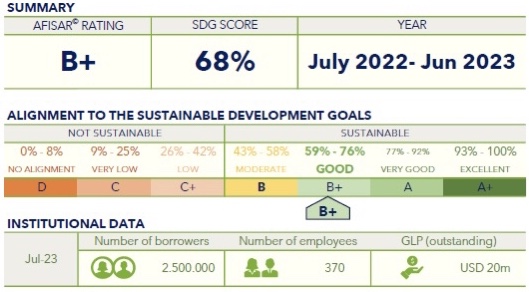 Sustainability reporting entails assessing, disclosing and managing an organization’s environmental, social and governance (ESG) impacts. This practice communicates to investors, customers, employees and regulators that the organization is committed to sustainability. The disclosure element, in particular, conveys values, strategies, risks, opportunities, accountability and transparency.
Sustainability reporting entails assessing, disclosing and managing an organization’s environmental, social and governance (ESG) impacts. This practice communicates to investors, customers, employees and regulators that the organization is committed to sustainability. The disclosure element, in particular, conveys values, strategies, risks, opportunities, accountability and transparency.
The significance of sustainability reporting within capital markets is increasing steadily, as more investors are seeking ESG information from potential and ongoing investees. This is due to the profound influence that ESG factors have on a company’s financial performance, risk profile and long-term prospects. Moreover, sustainability reporting contributes positively to the growth of the capital market, leading to increased size, liquidity and efficiency of the market for raising and investing funds. This growth benefits issuers, investors, the overall economy and society at large.
Sustainability reporting fosters capital market growth through many channels. By openly disclosing their ESG performance and impacts, organizations establish trust and credibility, setting themselves apart from competitors. This not only enhances their appeal to investors but also lowers the cost of capital. Moreover, integrating comprehensive and consistent ESG information with financial reporting bolsters market efficiency and transparency, reducing information asymmetry and mitigating agency issues. Additionally, the measurement and ongoing monitoring of sustainability progress drive organizations to improve their business models, products, services and processes, generating increased value for stakeholders. To contribute to the development of effective policies, it is important to comply with ESG disclosure regulations, such as the EU’s Non-financial Reporting Directive or the Task Force on Climate-related Financial Disclosures’ recommendations. Finally, by revealing ESG risks, organizations assist investors in identifying and managing these risks, leading to more efficient capital allocation, minimizing the potential for market shocks.
Multiple studies provide evidence that sustainability reporting offers medium- to long-term benefits to companies, enhancing their image and valuation, thereby making them more appealing to stakeholders and shareholders. Notably, sustainability reporting has been shown to increase a company’s valuation by fostering trust. For example, Unilever published a sustainability report highlighting progress on various ESG initiatives in 2019. Investors responded by driving a 10-percent rise in the company’s share price.
A study by the University of Oxford found that companies publishing sustainability reports tend to have higher valuations compared to those that do not. This is because sustainability reporting enables investors to better comprehend a company’s ESG risks and opportunities, resulting in improved investment decisions.
Despite the benefits, companies face various challenges in implementing sustainability reporting. One of these is a lack of in-house capacity to develop comprehensive ESG reports. Moreover, the complexity of the subject matter often leaves companies uncertain about what to report and how to ensure traceability. The absence of universally accepted reporting standards for sustainability further hampers the comparability of companies’ sustainability reports, making it challenging for investors to make informed decisions. Additionally, instances of “greenwashing” have resulted in inaccurate and misleading sustainability reports. Thus, a mutually acceptable framework and standards are necessary to guide the production and sharing of this information.
The future of sustainability reporting is promising, as investors increasingly are prioritizing ESG factors. The growing demand for sustainability reporting will drive companies to improve their sustainability performance and provide more transparent and comprehensive information regarding ESG risks and opportunities over time. To meet the expanding demand for sustainability reporting, companies must invest in developing their reporting capabilities. Collaborating with investors and other stakeholders is essential to establish common standards.
Sustainability reporting is not only a means of communication but also a catalyst for change. It plays a vital role in supporting the growth of capital markets, benefiting organizations and society as a whole. Therefore, it is crucial for organizations to embrace sustainability reporting as a strategic practice while investors, policymakers, regulators and other stakeholders actively support and encourage its adoption.
AFI’s role in sustainability reporting
Agents for Impact (AFI) plays a significant role in advancing sustainability reporting by offering expertise and tools to organizations aiming to measure, manage and communicate their social and environmental impact. AFI recognizes that this reporting is both a powerful means of demonstrating accountability and transparency to stakeholders as well as a strategic tool for identifying risks and opportunities, enhancing performance, and bolstering an organization’s reputation.

AFI has developed the Agents for Impact Sustainability Alignment Rating (AFISAR©) Tool to simplify the sustainability reporting process, particularly for microfinance and SME finance institutions. The AFISAR© Tool assesses the alignment of an organization’s sustainability performance, both at the institutional and portfolio levels, with the Sustainable Development Goals (SDGs). It also assists organizations in several additional, critical ways:
1) Selecting relevant topics and indicators;
2) Data collection and validation;
3) Assessing sustainability performance;
4) Professional reporting; and
5) Effective communication.
AFI’s role in sustainability reporting is marked by a commitment to making impact measurable and enabling organizations to align their sustainability efforts with the SDGs. Thus, AFI’s support and tools contribute to greater transparency, accountability and progress toward sustainable development within the business world.
Furthermore, AFI is in the process of developing a new version of AFISAR© that will help managers of §9 funds comply with the Sustainable Finance Disclosure Regulation, including by sharing data on the associated Principal Adverse Indicators.
In conclusion, sustainability reporting plays a pivotal role in nurturing capital market growth. By enabling organizations to transparently measure, manage and communicate their social and environmental impact, sustainability reporting enhances trust and reputation, lowers capital costs and fosters market efficiency. It drives innovation, supports policy development and assists investors in making informed decisions, ultimately promoting the efficient allocation of capital and reducing market vulnerabilities. The commitment of organizations like AFI to advancing sustainability reporting tools and methodologies supports this practice in shaping a more responsible and resilient global capital market.
This article was written by the Rating Department of Agents for Impact, which is the sponsor of this feature. Learn more on AFI’s LinkedIn page.
Similar Posts:
- SPECIAL REPORT: Agents for Impact: Well-equipped for Future Business Development
- SPECIAL REPORT: Agents for Impact – We Make Positive Impact Investable!
- SPECIAL REPORT: Partner with Agents for Impact, and We’ll Drive Impact Together!
- SPECIAL REPORT: ¡Viva el Cooperativismo – A Powerful and Efficient Way of Helping One Another!
- MICROFINANCE EVENT: Sustainability Week; March 29-31, 2023; London, United Kingdom
